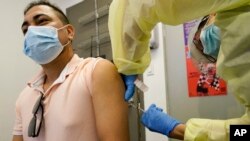"The committee has advised me that in its view, mpox [monkeypox renamed] remains a global health emergency, and I have accepted that advice," WHO director-general Tedros Adhanom Ghebreyesus stated.
The WHO chief said he reached that conclusion following the recommendations of the UN health agency's emergency committee, which met last Friday.
To date, 85,860 cases of the disease have been reported across 110 countries, including 93 deaths, according WHO figures.
The disease was first discovered in humans in 1970 in the Democratic Republic of Congo, and since then, has been mainly limited to certain West and Central African nations.
But last May, cases of the disease, which causes fever, muscular aches and large boil-like skin lesions, began spreading rapidly around the world.
Officials noticed a surge in what was then called monkeypox infections last May among men who have sex with men - outside the African countries where it has long been endemic.
On July 23, 2022, the WHO triggered a public health emergency of international concern (PHEIC).
The WHO's emergency committee on mpox meets every three months to determine if the label remains valid.
The committee acknowledged progress made in reducing transmission of the diseases, said Tedros.
But more than 30 countries were still reporting cases and in some regions not all cases might have been detected and reported, so all countries should remain vigilant, he added.




